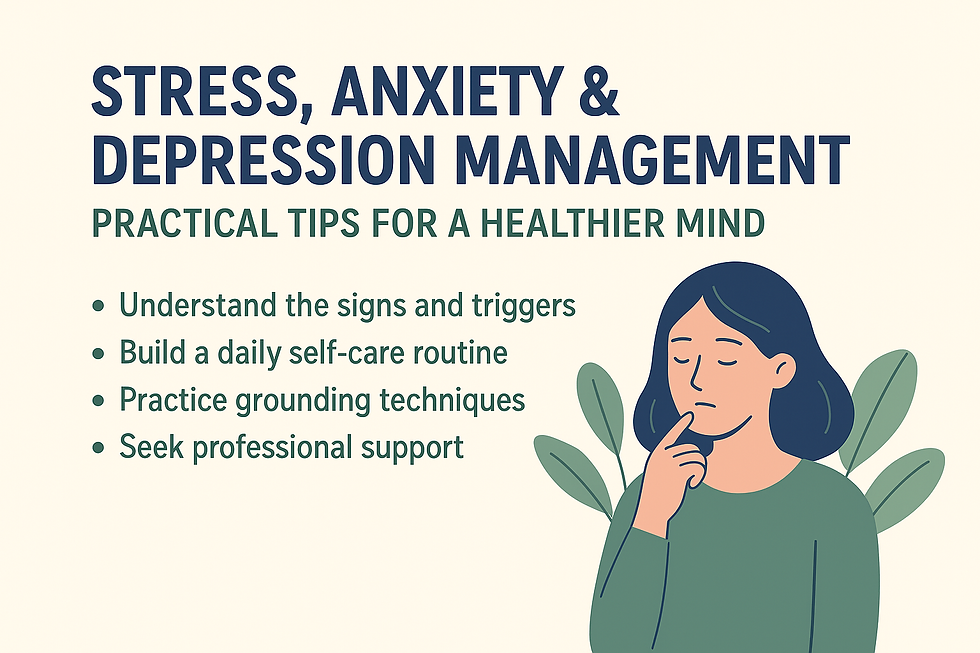Stress, Anxiety & Depression Management: Your Guide to Finding Balance
- ReeRee Dondada

- Aug 27
- 2 min read

Stress, anxiety, and depression can affect anyone—no matter their background, lifestyle, or success level. These challenges often intertwine, making it hard to tell where one ends and the other begins. Left unchecked, they can impact your mental clarity, relationships, productivity, and overall quality of life.
The good news? You can take meaningful steps toward managing them. While there’s no instant cure, small, consistent habits can help you regain control and create a sense of calm in your daily life.
Understanding the Difference
Stress is your body’s natural response to pressure. It’s not always bad—short bursts can help you perform—but chronic stress can wear you down.
Anxiety is a persistent sense of worry or fear, often about things that haven’t happened yet.
Depression involves ongoing feelings of sadness, hopelessness, or loss of interest in things you once enjoyed.
Recognizing which one (or combination) you’re experiencing is the first step toward effective management.
Practical Strategies for Stress Management
Identify Your Stress Triggers
Keep a journal of situations or people that heighten your stress. Awareness is the first step to change.
Practice Time Management
Break big tasks into smaller steps. Use a planner or digital tool to stay organized.
Incorporate Physical Activity
Even 10 minutes of stretching, walking, or dancing can lower stress hormones.
Tools for Anxiety Relief
Grounding Exercises
Try the “5-4-3-2-1” method: notice 5 things you see, 4 touch, 3 hear, 2 smell, and 1 taste.
Breathwork
Use the 4-7-8 technique: inhale for 4 seconds, hold for 7, exhale for 8.
Limit Caffeine & Sugar
These can heighten anxious thoughts and jitteriness.
Coping with Depression
Stick to a Routine
Depression can disrupt your daily rhythm. Keeping a set wake-up time, meals, and bedtime can stabilize your mood.
Reach Out for Connection
Isolation fuels depression. Even short check-ins with friends or support groups can help.
Seek Professional Support
A therapist or counselor can provide coping tools and an objective perspective.
Combining Strategies for Long-Term Wellness
Mindfulness & Meditation: Calms the mind and improves emotional regulation.
Healthy Nutrition: A balanced diet supports brain chemistry and energy levels.
Adequate Sleep: Aim for 7–9 hours to restore mental and physical health.
Self-Compassion: Speak to yourself as you would to a friend—kindly and without judgment.
The Bottom Line
Managing stress, anxiety, and depression is a journey, not a race. Small changes, repeated consistently, can have a powerful impact over time. Remember, it’s okay to ask for help, take breaks, and prioritize your well-being.
You are not your struggles—you are a whole person capable of healing and growth.





Comments